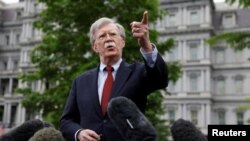U.S. President Donald Trump's national security adviser said Thursday the U.S. has helped prevent Iran from undertaking acts of aggression but warned the threat from Tehran still exists.
"I don't think this threat is over, but I do think you can make at least a conditional claim that the quick response and the deployment of and other steps that we took did serve as a deterrent," John Bolton told reporters in London.
Trump announced last Friday he would send 1,500 more troops to the Middle East, just days before Bolton announced that an aircraft carrier and bombers were dispatched to the Persian Gulf region. Bolton said the moves were in response to "clear indications of threats from Iran to American forces in the region."
Bolton, a hawk who has pushed for military force against Iran, also said he was not seeking a "policy of regime change in Iran." The statement came in response to a question about whether he and Trump disagreed on the issue.
Recent media reports suggested Trump is displeased with Bolton about how to limit Iran's influence in the Middle East. During his recent trip to Japan, Trump maintained he was not pushing for a regime change. Earlier this week, Trump joked to The New York Times, "We'd be in four wars by now" if Bolton determined U.S. foreign policy.
Trump further distanced himself from Bolton on Thursday, telling reporters he would be willing to negotiate with Iran on a nuclear agreement. Trump claimed Iran wants to make a deal after becoming a "weakened nation" due to the imposition of U.S. sanctions.
But Iran's Supreme Leader Ayatollah Ali Khamenei said he would not negotiate on issues related to his country's military capabilities. He added that Sharia law, not U.S. sanctions, is the reason Iran is not trying to acquire nuclear weapons.
Tensions between the two countries have further escalated this month, stoked by U.S. suspicions of Iranian military activity. Without evidence, Bolton claimed on Wednesday that naval mines "almost certainly from Iran" caused explosions recently on four oil tankers in the Gulf.
Many Trump critics blame the heightened tensions on his administration's withdrawal from the 2015 nuclear deal, designating part of Iran's military a terrorist group, and reimposing stiff sanctions on the Islamic Republic.





